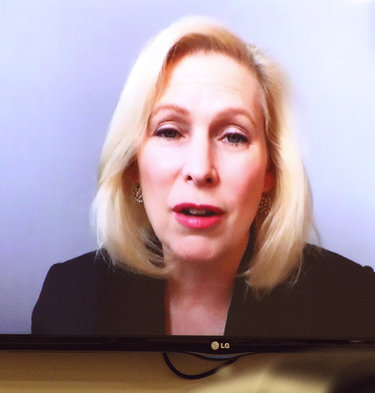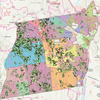Gillibrand pushes postal banking to serve the poor and save the post office
ALBANY COUNTY — Senator Kirsten Gillibrand wants to create postal banking.
“I want to deal with some of the economic inequality that’s really become obvious through this crisis,” Gillibrand said through a video conference call during Friday’s county press briefing. “We’ve seen that COVID disproportionately affects communities of color; we’ve seen it in Albany and, unfortunately, that’s because of … decades of institutional racism and other factors that affect people’s health.”
She said that communities of color often don’t have access to health care, clean air, clean water, and safe and appropriate housing.
Gillibrand wants to change access to capital. “One of the toughest things for a low-income American is they don’t have a savings account, a checking account,” she said, so they can’t get loans or mortgages.
She announced a bill last week to create a Postal Bank, which would establish a retail bank in each of the United States Postal Service’s 30,000 locations. New York State has 1,506 post offices.
Households would be able to open accounts at the post office with a $20,000 limit on checking and savings accounts, and would be able to take out loans capped at $500.
Rates on the loans would be linked to the one-month treasury bill constant maturity rate.
The Postal Bank would effectively wipe out predatory payday lending-industry practices, Gillibrand said in making the announcement, practices that cost the average underserved household 10 percent, or $2,412, of their gross income in fees and interest. This adds up to about $100 billion of lost savings for low-income families across the country, and results in diminished funding for rent, food, and childcare, as well as an inability to build credit.
On Friday, Gillibrand asked her listeners at the briefing to imagine needing $500 for an overdue heating bill or an unexpected car repair.
The United States Postal Service has been lukewarm in its response, stating, “The Postal Service’s mission is to provide the American public with trusted, affordable, universal mail service. Our core function is delivery, not banking. To the extent our research concludes that we can legally provide additional services at a profit and without distracting from our core business, we would consider these. However, public policy and regulatory discussions must be addressed before the Postal Service invests in an area outside our core function.”
Gillibrand asserted on Friday that the post office did banking from the turn of the century until the 1960s.
She said of the current United States Postal Service, “They want resources, they need resources, and they’re going to go out of business by this summer if we don’t do something.”
She also said that a national postal system is essential for voting by mail, which she thinks may be needed in November. She’s also an advocate of curbside voting and early voting to lessen social interaction during the pandemic.
More money is needed, she said, “to make sure our elections are secure.”
Gillibrand, a Democrat, said she has been working with the other New York Senator, Chuck Schumer, who has been the Senate’s minority leader since 2017, on getting more money for New York.
“We are going to keep fighting for more money … Our state didn’t get enough to fill budget holes,” said Gillibrand. She referenced the need for local and county governments to receive funds.
Albany County Executive Daniel McCoy has said Albany County is facing a $30 million budget hole due to lost sales-tax revenue.
“The good news is we are slowly but surely getting more money into our communities through these COVID packages,” Gillibrand said. “We’ve been able to get another $75 million into our hospitals. We were not able to get money for counties and cities and states, which was a huge disappointment but we are working very hard to make sure that’s in the next package.”
She also said that earlier packages didn’t have enough money for hunger relief. “It’s outrageous that we cannot make sure kids don’t go to bed hungry,” Gillibrand said, adding that she hopes money for food stamps will be included in the next bill.
The initial funds for small businesses, Gillibrand said, “got sucked up really fast by the bigger players who have relationships with big banks … They took the lion’s share of that money.”
So, with the second round of funding for the Small Business Administration’s Paycheck Protection Program, Gillibrand said, restrictions were put in place for money to go to “entities that have a billion dollars or less of savings … so that’s going to go to more credit unions, more community banks, more banks that serve Albany.”
Answering another need, Gillibrand said, “We sent money immediately for unemployment. The obvious rise in unemployment is pretty crippling … 26 million people is a lot of people. We expect to see much more.”
Checks were sent out for four months to anyone who is unemployed, she said. “We’re trying to help people survive this and it’s not nearly enough for people,” said Gillibrand. “Hopefully, it’s enough to keep food on the table and keep the lights on.”
Her top priority for the next package, Gillibrand said, is to have universal sick days. The last package had paid sick days for 25 percent of the workforce, she said, adding, “We want that to be 100 percent.”
Also, Gillibrand said, “We want to have more money for paid leave. We should have national paid leave.” If national paid leave had been funded in the first place, Gillibrand said, “It would have been so much easier than what we’re having to cobble together now.”
She said that national paid leave would “be the safety net to deal with any crisis like this in the future.”
Finally, Gillibrand recommends creating a “game-changing” Health Force.
“If we want to get our economy up and running, want to get kids back to school, we really need to increase testing. The last package included $24 million for COVID-19 testing.
Gillibrand described the proposed Health Force as “an AmeriCorps for health care.” She explained, “We’d train a million workers over the next two months.” These workers would do testing and contact tracing and, once a vaccine is developed, administer the vaccine.
“It could change the trajectory of this disease,” said Gillibrand, “because once you can test every kid before they go back to school, you can send your kid and not worry. You can test every kid who has a fever … figure out who’s been exposed and lock it down. You want to be able to be very rapid in your analysis of who’s been exposed … Otherwise, you’ll be stuck with it until we have a vaccine, which is about a year away.”



